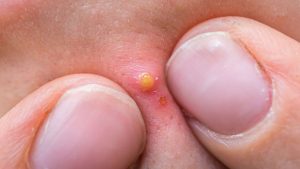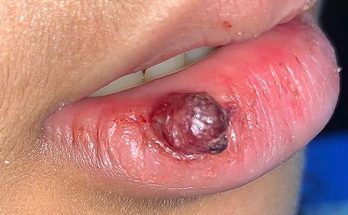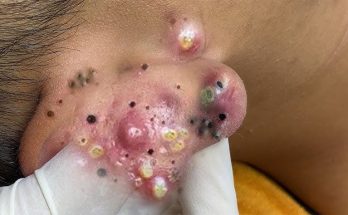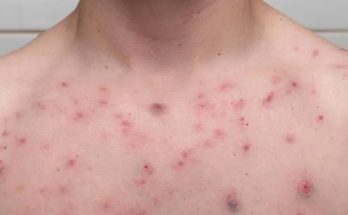
There are a few reasons why it may take time to heal a big pimple. It’s normal for some types of acne—especially deep, large pimples—to take longer to clear up. You might also have persistent pimples if you’re not taking care of your skin, are taking certain medications, or have specific health conditions.
In some instances, stubborn bumps on your face may not be pimples at all and may require you to see a healthcare provider or dermatologist for treatment.
:max_bytes(150000):strip_icc():format(webp)/bigpimple-02last-5a218c4f842b170019aeccc5.png)
Big Pimples Take Longer to Heal
If you’re dealing with pimples that won’t go away or keep coming back, it helps to understand what’s happening in your skin.
Breakouts happen when pores in your skin get clogged with excess oil and skin cells. Sometimes, bacteria can get into your pores and become inflamed and infected.
A large, deep pimple is often due to cystic acne or nodular acne. The main difference is that acne nodules do not contain fluid. They are more solid and firmer than acne cysts, which are filled with puss.
The smaller a pimple is and the closer it is to your skin’s surface, the faster it usually heals.
While a simple pimple will likely easily go away on its own, the deep, large, and often painful pimples that stem from hormonal or cystic acne can be much harder to clear up.
Why Your Acne Won’t Go Away
In addition to some types of pimples being more stubborn than others, acne may persist because of:
- Insufficient washing
- Sweating
- Over-the-counter acne products not being effective enough
- Hormonal fluctuations
- Certain medications, including hormonal birth control (pills that only contain progesterone can make acne worse)1
- Some health conditions, like polycystic ovary syndrome (PCOS)
Don’t Pop Big Pimples
You’re probably frustrated that your acne won’t go away, but some things you might be tempted to do to move the process along could make the situation worse.
First and foremost—don’t ever try to pop a deep pimple. Don’t poke it with a needle. Don’t squeeze it. Squeezing, poking, or otherwise messing around with the blemish makes the healing time longer. A pimple typically heals on its own in three to seven days. However, if you pop the pimple, it can become infected and take longer to heal.
Trying to pop a pimple can also seriously damage your skin and cause scarring, especially when the pimple is rooted deep in your skin.2 Squeezing it puts pressure on the already swollen pilosebaceous unit, or what is commonly called the pore.
It can also push dirt, dead skin cells, and other debris deeper into your pore. This can cause the follicle wall to break and allow infected material to spread in the skin. As much as you might like to, don’t try to drain your pimple.
Treating Big Pimples At Home
There are several things you can try at home to help speed the healing of a big pimple. Try the following suggestions, in addition to keeping your skin clean, changing pillowcases frequently, and eating a balanced diet.
Topical Acne Medication
To treat large deep pimples, such as those due to cystic acne or nodular acne, you can apply topical acne treatments. If you’re already using those medications, you can even dab a bit more on the pimple to help it heal more quickly. There’s no need to use too much, though; limit yourself to a twice-daily application. Using too much medication too often can dry out and irritate your skin rather than heal it.
There are also small, medicated “stickers” called hydrocolloid patches that you can place over a pimple. The medication helps dry out the pimple, while the sticker covers the pimple and keeps you from picking at it.
Be aware, however, that spot treatment works best for pustules. It won’t do much for deep nodules or cysts.
If you break out regularly but don’t typically use an acne treatment, now is a good time to start.3 Consistently using an acne treatment medication will stop blemishes from forming before they become huge pimples.
What About Home Remedies?
Never treat blemishes with items not meant for the skin. For example, things like garlic, honey, cinnamon, lemon, or toothpaste won’t heal acne cysts, contrary to what some online sources say.
Home remedies can’t get deep enough into the skin to do any good. At best, they’ll do nothing for the blemish. At worst, you’ll end up with an irritated spot or a red and itchy rash called contact dermatitis.
Warm Compresses
You may be able to soothe stubborn pimples by applying a warm compress. Make one by soaking a washcloth in really warm water. Apply it to the pimple for 20 minutes or so, a couple of times a day. You might have to do this for several days.
The warm compress can help the pimple to drain on its own. Remember, though, don’t squeeze at the pimple even if it comes to a head. Let it drain naturally.
Cold Pack
While there is no perfect overnight cure, you can shrink cystic pimples and other types of blemishes with a cold compress or ice pack. This immediately decreases inflammation.
Don’t put ice directly on your skin. Instead, wrap ice cubes or an ice pack in a clean cloth. You can also use a chilled tea back. Put pressure on the pimple with the ice for 10 minutes. Repeat the application two more times with 10-minute breaks in between.
Sun Protection
Your skin may be more sensitive to the sun when you’re using certain acne medications. If you have a breakout, avoid exposing your blemished skin to the sun. Wear a hat, sunglasses, and other protective clothing, and use a non-comedogenic broad-spectrum sunscreen with an SPF of 30 or higher,
When to See a Dermatologist
When at-home treatments aren’t helping, especially if you’ve had the blemish for more than a few weeks, a dermatologist can suggest procedures to try.
Contact your healthcare provider if a blemish is extremely large, inflamed, or painful, or if a pimple appears in a place you typically wouldn’t expect to find acne (e.g., your underarm, groin, or the back of your knee).4
Acne Surgery
Your dermatologist may recommend acne surgery. Deep cystic breakouts sometimes need to be lanced (cut open) and drained by a medical professional.
During acne surgery, a dermatologist will make a small incision in the skin and carefully drain the blemish.5 It’s a bit uncomfortable but once it’s done, your skin can begin healing.
It is important to have this done by a healthcare professional. An esthetician can’t (and legally, shouldn’t) lance a deep blemish, nor should you try to do it yourself.
Cortisone Injections
Another professional treatment for big pimples that won’t go away is a cortisone injection.6 A tiny needle is used to inject a diluted corticosteroid into the blemish. Within a few days, the pimple shrinks and disappears. Again, this procedure must be done by a dermatologist, but it’s a fast way to heal stubborn zits.
A cortisone injection should be seen as a last-resort treatment since it can cause side effects like an indentation of the skin around the injection site. Cortisone injections are not right for every person or every blemish. Check with your dermatologist to see if this is a good treatment for you.
Conditions That Resemble Acne
Many other skin problems cause acne-like blemishes. Your healthcare provider will be able to tell if it is acne or one of these conditions.
Boils
Sometimes, a big pimple that won’t go away is actually a boil—an infected hair follicle that looks exactly like a giant pimple. It starts as a red, painful bump under the skin and as it progresses it develops a white head. Some boils heal on their own with at-home treatment, but others need medical attention.
Ingrown Hairs
Ingrown hairs (pseudofolliculitis) are also easy to mistake for persistent pimples. They can cause large, painful, red bumps, especially if the follicle becomes infected. They’re more common in areas where you shave.
Exfoliating regularly can help prevent and treat ingrown hairs, but severe ingrown hairs may need to be treated with prescription medications.
Cold Sores
Pimples near the lip that won’t go away or keep coming back can easily be mistaken for cold sores, and vice versa. However, they’re two completely different skin blemishes. Cold sores are caused by the herpes simplex virus. While acne can’t be spread from person to person, the virus that causes cold sores is contagious.
Cold sores typically heal without any intervention, but if they’re widespread or incredibly painful, talk to your healthcare provider about what you can do.
Skin Cancer
Sometimes, acne that won’t go away is a more serious health condition. Although it’s not as common as the skin problems above, skin cancer can also cause a pimple-like bump on your skin.7 Any pimple, sore, or scaly patch that doesn’t heal within three weeks should be seen by your healthcare provider.
Summary
Big pimples that won’t go away no matter what you do can be frustrating but it’s sometimes normal. Larger pimples that are deep under the skin can take longer to heal. Picking or trying to pop pimples will only make them bigger, more painful, and more difficult to get rid of. Try using a spot treatment or applying a warm compress a few times a day. If that doesn’t help, your dermatologist may recommend another treatment.
However, acne that isn’t getting better can also be a sign of a bigger problem. If your pimple doesn’t go away within three weeks or is located on an area of your body where you don’t usually get acne, have your dermatologist check it out to ensure it isn’t something more serious.


